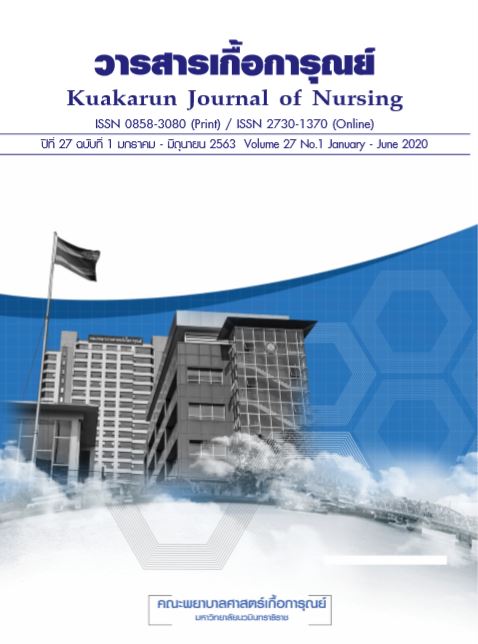ผลของโปรแกรมการส่งเสริมการกำกับตนเองต่อการควบคุมระดับน้ำตาลในเลือดของผู้ป่วยเบาหวานชนิดที่ 2 ที่ควบคุมระดับน้ำตาลในเลือดไม่ได้
คำสำคัญ:
การกำกับตนเอง, ระดับน้ำตาลสะสม, โรคเบาหวานชนิดที่ 2, การรับรู้ความสามารถตนเอง, พฤติกรรมบทคัดย่อ
การวิจัยกึ่งทดลองนี้มีวัตถุประสงค์เพื่อศึกษาผลของโปรแกรมการส่งเสริมการกำกับตนเอง ต่อการควบคุมระดับน้ำตาลในเลือดของผู้ป่วยเบาหวานชนิดที่ 2 ที่รับบริการที่ศูนย์บริการสาธารณสุข สำนักอนามัย กรุงเทพมหานคร คัดเลือกกลุ่มตัวอย่างจำนวน 58 รายซึ่งเป็นผู้ป่วยเบาหวานชนิดที่ 2 อายุตั้งแต่ 40 ปีขึ้นไป มีระดับ HbA1c มากกว่าร้อยละ 7.5 และรักษาด้วยยารับประทาน โดยแบ่งเป็นกลุ่มทดลอง 29 รายเข้ารับการฝึกตามโปรแกรมการส่งเสริมการกำกับตนเองต่อการควบคุมระดับน้ำตาลในเลือด ส่วนกลุ่มเปรียบเทียบ 29 รายเข้ารับการดูแลตามแนวปฏิบัติของศูนย์บริการสาธารณสุข เครื่องมือที่ใช้ในงานวิจัยเป็นแบบสอบถามทั้งหมด 5 ชุดได้แก่ (1) ข้อมูลทั่วไป (2) การรับรู้ความสามารถตนเองในการ ควบคุมระดับน้ำตาลในเลือด (3) พฤติกรรมการรับประทานอาหาร (4) การมีกิจกรรมทางกาย (5) พฤติกรรม การรับประทานยาโดยผ่านการตรวจสอบความตรงเชิงเนื้อหาจากผู้ทรงคุณวุฒิ 3 ท่าน ได้ค่าดัชนีความตรง เท่ากับ 1 และตรวจสอบความน่าเชื่อถือ ได้ค่าสัมประสิทธิ์ครอนบาคแอลฟา เท่ากับ 0.83, 0.72, 0.82, 0.68 ตามลำดับ ทำการเก็บข้อมูลด้วยแบบสอบถาม วิเคราะห์ข้อมูลโดยใช้สถิติ Chi-Squares, Independent t-test, pair t-test, Mann-Whitney U test และ Repeated measure ANOVA
ผลการศึกษาพบว่าหลังการทดลองสัปดาห์ที่ 8 และระยะติดตามผลสัปดาห์ที่ 12 กลุ่มทดลอง มีคะแนนเฉลี่ยการรับรู้ความสามารถตนเองและคะแนนเฉลี่ยด้านพฤติกรรมการรับประทานอาหาร การมีกิจกรรมทางกายและการรับประทานยา เพิ่มขึ้นมากกว่าก่อนการทดลอง และมากกว่ากลุ่มเปรียบเทียบ (p-value < 0.05) และพบว่าระดับ HbA1c ลดลงมากกว่าก่อนการทดลอง และลดลงมากกว่ากลุ่ม เปรียบเทียบ (p-value < 0.05) ข้อเสนอแนะจากผลการวิจัยครั้งนี้สนับสนุนให้เจ้าหน้าที่สาธารณสุข นำโปรแกรมการส่งเสริมการกำกับตนเองไปดูแลผู้ป่วยโรคเบาหวานชนิดที่ 2 ที่ควบคุมระดับน้ำตาลในเลือด ไม่ได้ เพื่อลดระดับน้ำตาลสะสมในเลือดและส่งเสริมการรับรู้ความสามารถตนเองในการควบคุมระดับน้ำตาล ในเลือดของผู้ป่วย การรับประทานอาหาร การออกกำลังกาย และการรับประทานยาของผู้ป่วยได้
เอกสารอ้างอิง
Rattarasarn C. Diabetes outbreak and its impact on Thailand. Bangkok: Novo Nordisk Pharma (Thailand) Ltd; 2013. (in Thai)
IDF Diabetes Atlas. International diabetes federation [Internet]. 2017 [cited 2018 Dec 8]. Available from: https://www.idf.org/e-library/epidemiologyresearch/diabetes atlas.html
Bureau of Epidemiology, Ministry of Public Health. Annual epidemiological surveillance report 2017 [Internet]. 2017 [cited 2018 Dec 8]. Available from: https://apps.boe.moph.go.th/boeeng/download/AESR-6112-24.pdf (in Thai)
Strategy and Planning Division, Ministry of Public Health. Statistical Thailand 2017 [Internet]. 2017 [cited 2018 Dec 8]. Available from: http://bps.moph.go.th/new_bps/sites/default/files/health%20stratistic%202560.pdf (in Thai)
American Diabetes Association. Standards of medical care in diabetes 2018. Diabetes Care 2018;41 supp 1:S1-S156.
Stratton IM, Adler AI, W. Neil HA, Matthews DR, Manley SE, Cull CA, et al. Association of glycaemia with macrovascular and microvascular complications of type 2 diabetes (UKPDS 35): Prospective observational study. British Medical Journal 2000;321(7258):405-12.
Himathongkam T, Ratchatanawin R, Ningsanon T. Knowledge of diabetes complete. 3rd ed. Bangkok: June Publishing Company; 2012. (in Thai)
Phetarvut S, Watthayu N, Suwonnaroop N. Factors predicting diabetes self-management behavior among patients with diabetes mellitus type 2. Journal of Nursing Science 2012;29(4):18-26. (in Thai)
National Health Security Office and MedResNet. Results of evaluation of care for patients with type 2 diabetes and hypertension of hospitals under the Ministry of Public Health and hospitals in Bangkok for the year 2015 [Internet]. 2010 [cited 2018 Dec 8]. Available from: https://dmht.thaimedresnet.org/document/NHSO2558_NATIONAL_Meeting.pdf (in Thai)
Suwattanakul T. Factors related to blood sugar control among diabetes mellitus type 2 patients. Journal of Public Health System Research 2018;12(3):515-22. (in Thai)
Cramer JA. A systematic review of adherence with medications for diabetes. Diabetes Care 2004;27(5):1218-24.
Bandura A. Social foundations of thought and action: a social cognitive theory. United States of America: Prentice-Hall; 1986.
Youkong S, Sompopcharoen M, Kengganpanich T, Rawiworrakul T, editors. Effects of self – regulation program on diet control for patients with type 2 diabetes. The 17th national health education conference on “the role of people and the change in health behavior”; 2015 May 14-16; Jomtien Palm Beach Hotel and Resort, Pattaya City, Chonburi. (in Thai)
Saengsuwan S, Asawachaisuwikrom W, Homsin P. Effect of self-regulation with clinical information program on eating behavior and blood sugar level among uncontrolled diabetic patients. The Journal of Faculty of Nursing Burapha University 2011;19(3):54-64. (in Thai)
Walker EA, Shmukler C, Ullman R, Blanco E, Scollan-Koliopoulus M, Cohen HW. Results of a successful telephonic intervention to improve diabetes control in urban adults: a randomized trial. Diabetes Care 2011;34(1):2-7.
Cohen J. Statistical power analysis for the behavioral sciences. 2nd ed. New Jersey: Lawrence Erlbaum Associates; 1988.
Department of Mental Health. Chronic disease clinic revised version: guidelines for using mental health tools for public health personnel in community hospitals. 2nd ed. Nonthaburi: Agricultural Cooperative Assembly of Thailand; 2015. (in Thai)
Egede LE, Ellis C. The effects of depression on diabetes knowledge, diabetes self-management, and perceived control in indigent patients with type 2 diabetes. Diabetes Technology & Therapeutics 2008;10(3):213-9.
Terjitphaisan T, Palidnonthikeat A, Petcharoak S. Behaviors of diabetes mellitus in high risk group control at one of the hospital in Samut Prakan academic review report and research presentation national and International no. 6. Samut Prakan: National Group Science; 2015. (in Thai)
Kiernan M, Schoffman DE, Lee K, Brown SD, Fair JM, Perri MG, et al. The Stanford leisure-time activity categorical item (L-Cat): A single categorical item sensitive to physical activity changes inoverweight/obese women. International Journal of Obesity 2013;37(12):1597-602.
Sommung P, Tansakul S, Therawiwat M, Kengganpanich T, editors. The effects of a bless program for excerise behavior among type 2 diabetes patients the 17th national health education conference on. “The Role of People and the Change in Health Behavior”; 2015 May 14-16; Jomtien Palm Beach Hotel and Resort, Pattaya City, Chonburi. (in Thai)
Tavakolizadeh J, Moghadas M, Ashraf H. Effect of self-regulation training on management of type 2 diabetes. Iranian Red Crescent Medical Journal 2014;16(4):e13506-e64581.
Ngamprasert W, Rawiworrakul T, Pandii W, Auemaneekul N. Effects of a self-regulation program on exercise among Thai Muslim elderly with diabetes in community, Bangkok. Journal of Nursing Science Chulalongkorn University 2010;22(1-3):94-107. (in Thai)
Ingkamanee N, Kusuma Na Ayuthya S, Puwarawuttipanit W, Peerapatdit T. Effectiveness of promoting a problem-solving ability program on medication adherence in patients with type 2 diabetic. Journal of Nursing Science 2011;29(2):56-64. (in Thai)

















